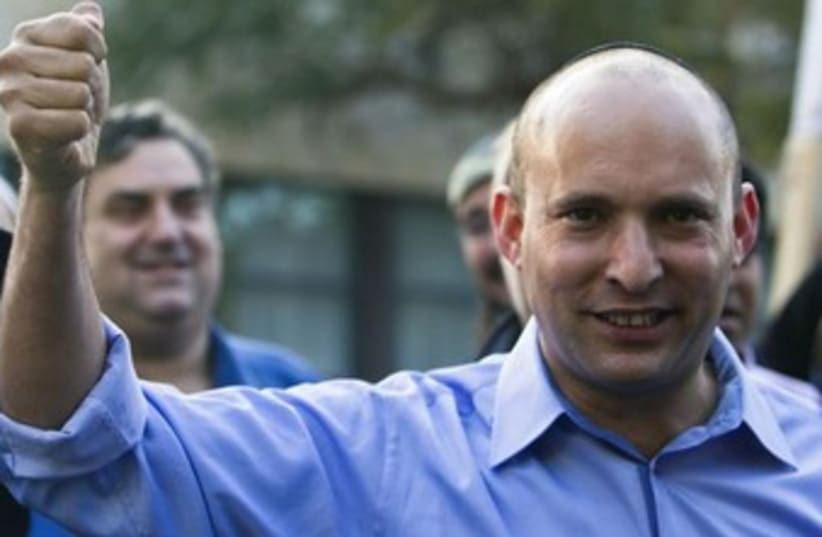Reversing its earlier stance, the Chief Rabbinate has formally decided that
testimony from prominent US rabbi Avi Weiss
regarding individuals’ status as Jews will be accepted by the Israeli body.
The Jerusalem Post has learned that in recent days Jerusalem and Diaspora Affairs Minister Naftali Bennett became personally involved in the issue and spoke to the relevant parties to help bring about the resolution.In a letter dated January 15 to Weiss’s lawyer, the Chief Rabbinate’s legal adviser wrote that after an internal meeting and “further clarifications on the matter,” the rabbinate reached an agreement to accept Weiss’s testimony on Jewish and personal status.In October, it was discovered that the Chief Rabbinate had rejected the credentials of Rabbi Weiss for providing this kind of testimony, after receiving reports from Orthodox rabbis in the US that said Weiss did not adhere to an Orthodox interpretation of Jewish law.Weiss is a Modern Orthodox rabbi who leads an Orthodox congregation. Some of his activities have aroused controversy in the Orthodox world, however – particularly his establishment of a seminary for women that ordains women as rabbis.The rejection of his credentials generated outrage in the Orthodox Jewish community in the US, as well as from Modern Orthodox groups in Israel, and strained relations between the Diaspora and the religious establishment in Israel.NGOs such as ITIM, Tzohar and Ne’emanei Torah Va’avodah argued that it was unacceptable for the Chief Rabbinate to make decisions based on hearsay and gossip, and threatened to petition the case in the High Court of Justice.Bennett, who is also the Religious Services Minister, has treated the issue as one of great importance, due to the impact it was having on Israel- Diaspora relations.The Bayit Yehudi leader met with Chief Rabbi David Lau last week, and it is believed that they discussed this issue.Jewish immigrants to Israel frequently need a rabbi from their community abroad to testify that they are Jewish, and cannot marry in Israel without a rabbi’s confirmation of their marital status.But in recent months, there have been increasing numbers of Orthodox rabbis whose credentials the Chief Rabbinate has rejected, particularly from the US but also in Europe. But other than Weiss and Berman, none have spoken out.The Postreported last week about Rabbi Scot Berman of Toronto
, whose testimony was also recently rejected.Rabbi Seth Farber, director of the ITIM religious services advisory group that has worked extensively on this issue, welcomed the rabbinate’s decision on Rabbi Weiss but said that much remained to be done to solve the broader issue.“The travesty that began six months ago with a couple who turned to our offices to arrange their marriage registration has now been resolved,” Farber said. “However, the wider issue of a public governmental body capriciously rejecting rabbis’ letters still remains open, and ITIM calls upon the Chief Rabbinate to formulate criteria which will be transparent and not rely on hearsay.“Although the Rabbi Weiss saga is behind us, there are other rabbis whose letters were rejected, including Rabbi Scot Berman. ITIM sees this battle as going beyond one rabbi or group of rabbis. ITIM has put a proposal in front of Chief Rabbi Lau which would enable the rabbinate to recognize institutions rather than individuals. This proposal would put an end to the irresponsible policy of the rabbinate.”Negotiations to create a reliable and transparent process for the authorization of the credentials of Diaspora rabbis are ongoing between the Chief Rabbinate and the Rabbinical Council of America, an association of Orthodox US rabbis, but an agreement has yet to be reached.The Ne’emanei Torah Va’avodah moderate national religious organization that was also heavily involved in working out the deal, and whose lawyer negotiated on Weiss’s behalf, welcomed the agreement.It said the decision represented “recognition of the life work of Rabbi Avi Weiss” and “the halachic legitimacy of Modern Orthodox rabbis.”Shmuel Shattach, director of Ne’emanei Torah Va’avodah, added: “We hope that this decision will represent a historical change in policy and recognition of Modern Orthodox rabbis. The whole issue proves the necessity of the communal model as the correct way to conduct Israel’s religious services and institutions.”Weiss himself expressed thanks for the “overwhelming support I received from all over the world,” and said an injustice had been corrected.Like ITIM, however, Weiss said that the issue was broader, and that the approval of his credentials was just a first step.“This was never about me personally,” the rabbi said. “I will continue to speak out until all rabbis of the International Rabbinic Fellowship and the Rabbinical Council of America will be formally recognized for this purpose. I also urge the Chief Rabbinate to reflect on how it can help us reach out, respect and acknowledge all Jews in the Diaspora.”
